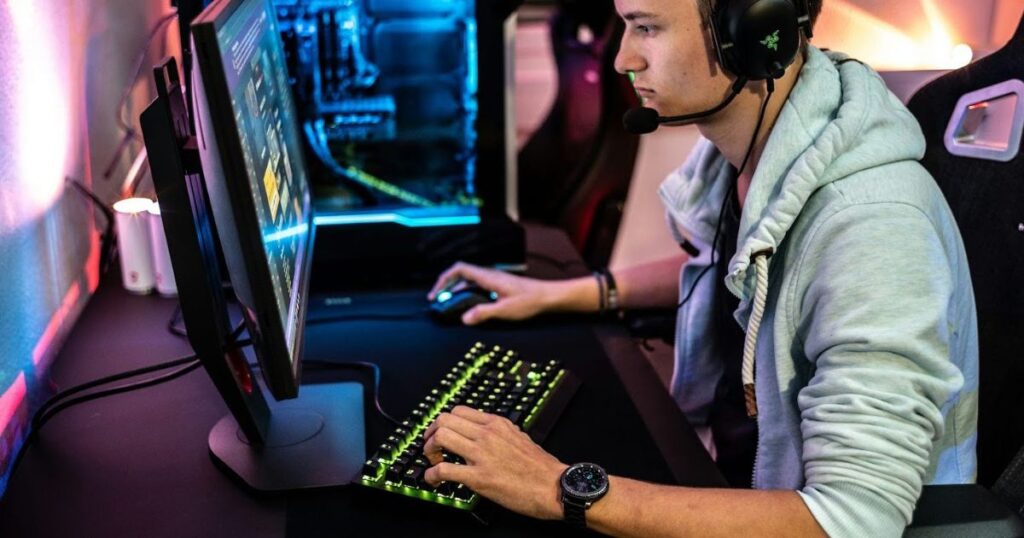Esports tournaments have become a global spectacle, drawing millions of viewers and participants. These events showcase top-tier skills in various games, each with its unique format and structure.
This guide highlights the biggest tournaments, explaining how they work, their impact, and where to watch them.
Types of Tournaments
Esports tournaments come in various forms, offering opportunities for players of all skill levels to compete. Whether online or offline, these events cater to a wide range of participants:
- League-Based Tournaments: Compete over a season, accumulating points in tournaments, like the League of Legends Championship Series.
- Knockout Tournaments: Face direct elimination in high-stakes events, like The International for Dota 2.
- Invitational Tournaments: Reserved for the elite, showcasing top-tier competition.
- Open Tournaments: Open to all, offering amateurs the chance to compete against professionals.
No matter the format, each tournament allows players to make their mark. And as you rise through the ranks, why not design a custom esports jersey to show off your unique style and team spirit? Whether you’re in it for fun or aiming for the top, your journey starts with the right gear.
The Mechanics of Esports Tournaments
Esports tournaments are structured competitive events where individuals or teams compete in video games for prestige and prizes. Standard tournament formats include:
Single-Elimination
Single-elimination mechanics are widely used in esports tournaments and are characterized by a straightforward and rapid progression structure.
In this format, each match results in one player or team being eliminated from the game while the winner advances to the next round. This process continues until only one competitor remains, declared the champion.
Double-Elimination
Double-elimination tournaments in esports are structured to give participants a second chance after an initial loss. The format ensures that a competitor must lose twice before being eliminated from the tournament entirely.
Round-Robin
Round-robin mechanics are a popular tournament format in esports. Each participant competes against every other participant in this format, typically once. This format ensures a comprehensive assessment of skills and performance, distinguishing it from elimination-style tournaments.
Swiss System
The Swiss system is a tournament format commonly used in esports. It allows participants to compete against each other in a manner that balances fairness and efficiency.
Unlike traditional knockout or round-robin formats, the Swiss system enables players or teams to compete multiple times without being eliminated after a single loss.
Stay Physically Fit: Physical fitness can impact your gaming performance. Maintain a healthy routine to improve focus, reflexes, and endurance.
How to Qualify
The qualification process for major esports tournaments is a multifaceted system that ensures the participation of the most skilled and competitive players or teams.
This process typically involves several stages, each with its own criteria and requirements. Below is an in-depth look at the various components of the qualification process:
Open Qualifiers
Open qualifiers are the initial stage where any team or player can register to compete. These qualifiers are usually held online and are open to a broad audience, allowing new and emerging talent to participate.
Matches in open qualifiers are often played in a single-elimination or double-elimination format to narrow the number of participants quickly.
Regional Qualifiers
Following the open qualifiers, successful teams or players advance to regional qualifiers. These are geographically segmented to ensure representation from different parts of the world.

Regional qualifiers may include multiple rounds of competition, often culminating in a final round where the top teams or players from each region are determined.
Invitational Slots
In addition to open and regional qualifiers, many significant tournaments reserve slots for invited teams or players. These invitations are typically extended to high-ranking or well-known entities within the esports community.
Invitations are based on past performance, rankings, and sometimes the marketability of the team or player.
Points and Rankings Systems
Some tournaments utilize a points or rankings system to determine qualification. Players or teams accumulate points through various sanctioned events throughout the season.
The accumulated points are then used to rank participants, with the highest-ranking individuals or teams earning spots in the major tournament.
Closed Qualifiers
Closed qualifiers are another stage where only teams or players who have advanced from open qualifiers or have been invited can compete. These qualifiers are more exclusive and often feature a higher level of competition.
The format for closed qualifiers can vary, but it generally involves multiple rounds of play to ensure that only the best advance.
Wildcard Entries
Some tournaments offer wildcard entries, unique slots given to teams or players who may not have qualified through the standard process but are deemed worthy of participation due to exceptional circumstances or potential.
Direct Qualification
Sometimes, the winners of specific events or leagues are granted direct qualification. For example, winning a regional championship might provide direct entry into a global tournament.
Jump into Amateur Esports Tournaments
Alt Text: cheerful amateur esports gamers
Amateur tournaments are a vital entry point for new players aspiring to enter the competitive esports scene. The following outlines key aspects of amateur tournaments:
Benefits of Participating in Amateur Tournaments
- Skill Development: Regular competition helps players improve their gameplay, understand meta-strategies, and adapt to different playstyles.
- Exposure and Networking: Performing well in amateur tournaments can increase one’s visibility within the community, attracting the attention of scouts and professional teams.
- Team Dynamics: Players often form or join teams in amateur tournaments, learning essential skills in communication, coordination, and teamwork.
Advancement to Professional Levels
- Scouting and Recruitment: Professional teams frequently scout amateur tournaments for promising talent. Players who perform exceptionally well may receive invitations to join professional rosters or participate in higher-tier qualifiers.

- Ranked Ladder Systems: Some games have integrated ranked systems that feed into professional circuits.
- Path to Pro Programs: Certain game developers and organizations run structured programs to transition amateur players to professional status.
Amateur tournaments are essential to the esports ecosystem, providing new players opportunities to develop their skills, gain exposure, and potentially advance to professional levels.
Expert Tips: Set specific goals for each practice session, such as improving reaction time, perfecting a strategy, or mastering a particular role within the game.
Embrace the Thrills of Global Esports
Esports tournaments are at the forefront of digital entertainment, offering intense competition, substantial rewards, and a global community. Whether you’re a player or a viewer, understanding these events opens up new ways to engage with the ever-evolving world of competitive gaming.

